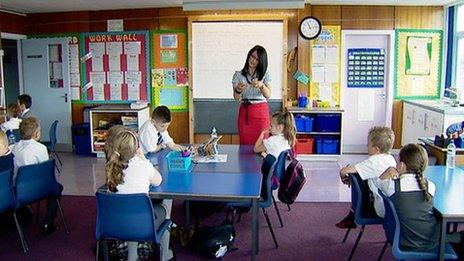'No need' for curriculum red tape, education secretary Russell says
- Published

Nursery and primary school teachers have warned of increasing workloads
The education secretary believes there is no need for councils and head teachers to surround education reforms with unnecessary paperwork.
Mike Russell will deliver the message to delegates at the Educational Institute of Scotland conference on the new Curriculum for Excellence (CfE).
A recent poll of nursery and primary school teachers warned of high workloads created by the curriculum.
The EIS welcomed a focus on cutting unnecessary bureaucracy.
Ahead of his speech to the conference on Saturday, the education secretary said CfE was designed to bring "clarity" and that schools, head teachers and councils should not surround this with "a smokescreen of bureaucracy and unnecessary paperwork".
'Needs to stop'
School inspectors will be tasked with eliminating excessive planning, recording and reporting practices.
Mr Russell said: "Two weeks ago the EIS survey on primary education highlighted some legitimate concerns about teacher workload.
"I have been very clear in my response to those concerns.
"It is utterly unacceptable that any school, head teacher or local authority should be able to surround the clarity of CfE with a smokescreen of bureaucracy and unnecessary paperwork. That needs to stop and it needs to stop now.
"CfE is about giving teachers greater scope for professional decision making and ensuring young people are fit to succeed in whatever destination they move to after school."
Education Scotland director of inspection Ken Muir said: "In a number of recent inspection reports, HM Inspectors from Education Scotland have been critical of overly bureaucratic approaches, and will do so in the future where such approaches are found.
"Our forthcoming inspection guidance will make clear that the delivery of high-quality learning should not be impaired by excessive time spent on planning, recording and reporting."
EIS general secretary Larry Flanagan said: "It is encouraging that we are hearing positive messages from both the cabinet secretary and Education Scotland about the importance of reducing unnecessary administrative workload, in order to free up teachers to teach.
"While many teachers will not automatically associate a visit from the inspectors as something that will lower workload, it is encouraging that tackling unnecessary local authority bureaucracy will be a focus for inspectors in the future."
- Published24 May 2013
- Published30 April 2013
- Published20 September 2012
- Published10 May 2012